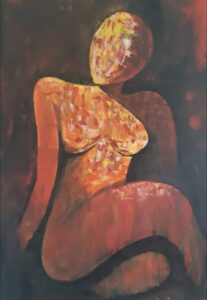Continua la collaborazione tra il liceo linguistico "Cattaneo-Dall'Aglio" e la rubrica "Speakeasy", curata direttamente dagli studenti dell'anno 2021-2022.
****

We chose to write about this article because when we read it we were very impressed, but at the same time also embittered as women. In fact, the article is about women, but unfortunately not about something pleasant. Every year thousands of women are trafficked to European countries and are forced to have sex with men.
A witness of this terrible experience is Jewel, a young Nigerian woman who went to Denmark to work with the elderly. This was what she expected, but the truth turned out to be different. Jewel was taken to the red light district in Copenhagen by another Nigerian woman, who told her that this would be her job.

In addition to this terrible situation, these girls are also continually in debt to their traffickers. Just as the article states "they are bound by debt" and the fastest way to earn money and to repay debts is unfortunately in the sex trade. Jewel was continually subjected to threats aimed at both her and her family, until she paid the traffickers the sum of 42,000 euros.
It is also important to focus on the psychological aspect of this way of life. Jewel was constantly under enormous pressure, she was desperate and so depressed that she tried to take her own life. She still owed a huge sum of money and feared for her safety and that of her family in Nigeria.

Let's not forget Michelle Mildwater who played a pivotal role for Jewel. She encouraged her to write a play where she tells her story and then to perform it for an audience in Copenhagen. As the young Nigerian reports, this was really a therapy for her.
To conclude we want to mention the following sentence by Jewel: “This is not just a story-this is people’s reality.”
Well, yes, this is reality, our reality. We live in a world of exploitation, where even today women are considered inferior.We are not aware of this big problem, sexual exploitation continues to be the main purpose of human trafficking. Women are like objects and people get rich by exploiting them. As women, we realize how serious this reality is, because conditions of this kind should not exist in a so-called “modern” society.We hope that in the future, everyone will fight to defend human rights.
(Elenoire Ghinoi e Irene Parmeggiani, classe 4ªQ)
****
La storia della fuga di un sopravvissuta.
Abbiamo scelto di condividere questo articolo perché quando lo abbiamo letto siamo rimaste molto colpite, ma allo stesso tempo anche amareggiate in quanto donne. Infatti, l'articolo riguarda le donne, ma sfortunatamente non per qualcosa di piacevole. Ogni anno migliaia di donne vengono trafficate nei paesi Europei e sono costrette ad avere rapporti sessuali con uomini.
Testimone di questa terribile esperienza è Jewel, una giovane donna nigeriana che si è recata in Danimarca per lavorare con gli anziani. Questo era quello che si aspettava, ma la verità si è rivelata diversa. Jewel è stata portata nel quartiere a luci rosse di Copenhagen da un'altra donna nigeriana, che le ha detto che quello sarebbe stato il suo lavoro. La stessa notte, ha incontrato Michelle Mildwater di HopeNow, un’organizzazione che supporta le persone vittime di traffico in Danimarca che le ha dato una carta con un numero di telefono, tuttavia il suo capo le ha detto di non fidarsi di questa donna e Jewel ha incontrato rapidamente il suo primo cliente. L'articolo della BBC riporta anche testimonianze dirette della giovane donna.
Oltre a questa terribile situazione, queste ragazze sono continuamente indebitate con i loro trafficanti. Così come l'articolo afferma "sono legate da debiti" e il modo più veloce per guadagnare denaro e ripagare i debitori è purtroppo nell'industria del sesso. Jewel è stata continuamente oggetto di minacce rivolte sia a lei che alla sua famiglia, fino a quando non ha pagato ai trafficanti la somma di 42.000 euro.
È anche importante concentrarsi sull'aspetto psicologico di questo tipo di vita. Jewel era costantemente sotto un’enorme pressione, era disperata e così depressa che ha cercato di togliersi la vita. Doveva ancora un'enorme somma di denaro e temeva per la sua sicurezza e quella della sua famiglia in Nigeria.
La luce in fondo al tunnel arriva anche per Jewel: incontra un danese di cui si innamora. Quest'uomo diventerà in seguito suo marito. La giovane ha finalmente smesso di lavorare in strada e non ci sono state ripercussioni né per lei e né per la sua famiglia. La sua vita è cambiata radicalmente. Ha avuto un bambino e sta aspettando l'esito della sua domanda di soggiorno in Danimarca. Vuole fare volontariato aiutando le donne per strada.
Non dimentichiamo Michelle Mildwater che ha avuto un ruolo fondamentale per Jewel. L'ha incoraggiata a scrivere un'opera teatrale, nella quale racconta la sua storia, e poi di recitarla per il pubblico a Copenaghen. Come racconta la giovane Nigeriana, per lei questa è stata davvero una terapia.
Per concludere vogliamo citare la seguente frase di Jewel: "Perché questa non è solo una storia, questa è la realtà delle persone".
Ebbene sì, questa è la realtà, la nostra realtà. Viviamo in un mondo di sfruttamento, dove anche oggi le donne sono considerate inferiori. Non siamo a conoscenza di questo grosso problema, lo sfruttamento sessuale continua ad essere lo scopo principale della tratta. Le donne sono come oggetti e molte persone si arricchiscono sfruttandole. Come donne, ci rendiamo conto di quanto sia grave questa realtà, perché condizioni di questo tipo non dovrebbero esistere in una società cosiddetta “moderna”. Ci auguriamo che in futuro si possa tutelare ogni forma di diritto umano.
https://www.bbc.com/news/stories-58994212
(Elenoire Ghinoi e Irene Parmeggiani, classe 4ªQ)








Lavoro meraviglioso ragazze. Complimenti!
(Stefano)
Anch’io mi unisco ai complimenti per questi “pezzi” che Redacon ci propone con cadenza pressoché settimanale nel corso dell’anno scolastico.
P.B. 08.11.2021
(P.B.)